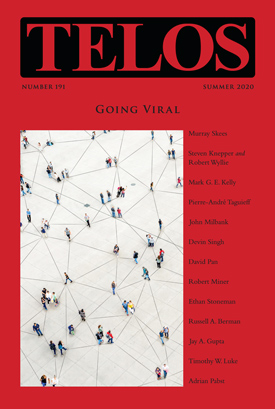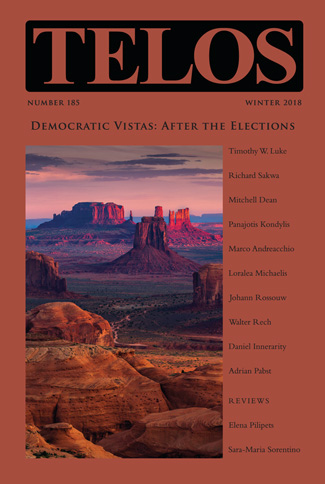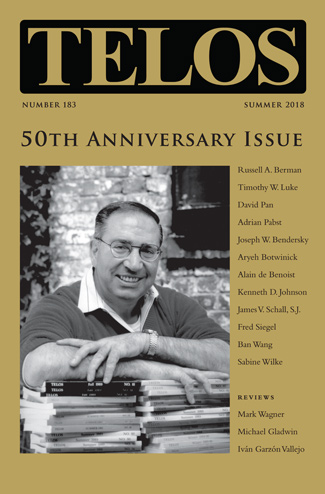By Russell A. Berman · Wednesday, June 17, 2020 The following essay is part of a group of responses to the COVID-19 pandemic that appear in Telos 191 (Summer 2020): Going Viral, which is now available for purchase in our store. Individual subscriptions to Telos are also available in both print and online formats.
 As of this writing, the precise origin of the Chinese virus, SARS CoV-2, remains unclear. It is however known that cases predated the eruption in the “wet market” in Wuhan—which in the meantime has been reopened, suggesting at least that Chinese authorities do not believe it was the source of the pandemic. The alternative theory that the virus escaped from experiments in one of Wuhan’s virology laboratories therefore remains plausible. In any case, it is certain that Wuhan was the first epicenter and that state authorities used repressive power to delay alerting the world by possibly more than a month. With that additional time, the spread of the disease might have been contained, or its dissemination at least impeded, if China and the World Health Organization had acted with transparency and integrity. They did not. As of this writing, the precise origin of the Chinese virus, SARS CoV-2, remains unclear. It is however known that cases predated the eruption in the “wet market” in Wuhan—which in the meantime has been reopened, suggesting at least that Chinese authorities do not believe it was the source of the pandemic. The alternative theory that the virus escaped from experiments in one of Wuhan’s virology laboratories therefore remains plausible. In any case, it is certain that Wuhan was the first epicenter and that state authorities used repressive power to delay alerting the world by possibly more than a month. With that additional time, the spread of the disease might have been contained, or its dissemination at least impeded, if China and the World Health Organization had acted with transparency and integrity. They did not.
Continue reading →
By Russell A. Berman · Thursday, April 9, 2020  Once upon a time, there was an illusion that the state would disappear. It was the fiction Marxists told each other at bedtime, and it was the lie of the Communists, once they had seized state power. For even as they built up their police apparatus and their archipelago of gulags, they kept promising that one day the state would eventually disappear. Once upon a time, there was an illusion that the state would disappear. It was the fiction Marxists told each other at bedtime, and it was the lie of the Communists, once they had seized state power. For even as they built up their police apparatus and their archipelago of gulags, they kept promising that one day the state would eventually disappear.
Of course, in a sense, they were right because Communism ended and so did the Communist states in Russia and Eastern Europe. Yet the death of those regimes is in no way an argument for the death of statehood itself.
The state is the expression of sovereignty, and sovereignty is the ability of national communities to decide their own fates. Such independence is far from obsolete, and certainly not for the countries on the eastern flank of the European Union. After years of Russian occupation, they have regained their state sovereignty. They will continue to insist on it, and rightly so.
Continue reading →
By Russell A. Berman · Wednesday, December 12, 2018 Telos 185 (Winter 2018) is now available for purchase in our store. Individual subscriptions to Telos are also available in both print and online formats.
 Recall the 2016 campaign and even more the aftermath of the Trump victory: otherwise reasonable people rushed into heated rhetoric regarding the imminence of dictatorship and the end of democracy as we know it. Comparisons of the America of 2016 and Germany of 1933 proliferated, while denunciations of Republicans as Nazis or Nazi collaborators became common. It would be a worthwhile project for a student or scholar of American culture to cull through those statements and confront their authors with them today: if they were so wrong in 2016, what value is their judgment today, moving forward? Recall the 2016 campaign and even more the aftermath of the Trump victory: otherwise reasonable people rushed into heated rhetoric regarding the imminence of dictatorship and the end of democracy as we know it. Comparisons of the America of 2016 and Germany of 1933 proliferated, while denunciations of Republicans as Nazis or Nazi collaborators became common. It would be a worthwhile project for a student or scholar of American culture to cull through those statements and confront their authors with them today: if they were so wrong in 2016, what value is their judgment today, moving forward?
For those predictions were simply and utterly wrong. Of course, the Republican in the White House and the Republican-controlled Congress pursued a version of a conservative agenda (although not always with success, as in the case of health care). But the rule of law prevailed, courts could decide against the government, the liberal part of the press has been articulate in its critique of administration policies, and, in a quite normal and proper manner, the midterm elections took place. American institutions have proven much more robust than the hysterics of little faith claimed in 2016. Those prophets of dictatorship owe us an accounting—or actually an apology—for their hyperbole. They significantly trivialized what really happened under the Nazi dictatorship, and they cavalierly slandered that slightly less than half of the American electorate that voted for Trump. Time for some critical self-reflection? This is not at all a suggestion that they must endorse the president, but it is way past time for them to concede that his supporters are not a priori Nazis, no matter how much juvenile fun name-calling affords.
Continue reading →
By Russell A. Berman · Monday, June 11, 2018 Telos 183 (Summer 2018), celebrating the fiftieth anniversary of the journal Telos, is now available for purchase in our store.
 Telos began this anniversary year with our previous issue’s exploration of the legacy of Martin Luther King, Jr., tragically assassinated fifty years ago in April. That too was 1968, the excitement of profound social change and the bitter taste of disappointment. So much in our culture today remains framed by that specific polarity. Now, in this issue of the journal, we take stock more broadly: not a judgment on that one year but a return to some of the key themes that have defined Telos. We have been able to carry on these discussions thanks to the vision of the founder, Paul Piccone, the support of our publisher, Mary Piccone, the dedication of our editorial group, the intellectual agility of our authors, and the loyalty of our readers. Thanks to all. Telos began this anniversary year with our previous issue’s exploration of the legacy of Martin Luther King, Jr., tragically assassinated fifty years ago in April. That too was 1968, the excitement of profound social change and the bitter taste of disappointment. So much in our culture today remains framed by that specific polarity. Now, in this issue of the journal, we take stock more broadly: not a judgment on that one year but a return to some of the key themes that have defined Telos. We have been able to carry on these discussions thanks to the vision of the founder, Paul Piccone, the support of our publisher, Mary Piccone, the dedication of our editorial group, the intellectual agility of our authors, and the loyalty of our readers. Thanks to all.
Continue reading →
By Russell A. Berman · Thursday, April 5, 2018 Cary Nelson and Telos editor, Russell Berman, respond to Saree Makdisi and raise broader questions about the contemporary humanities. Read their essay at Fathom.
Continue reading →
By Russell A. Berman · Wednesday, March 28, 2018 The ethnic cleansing in Syria is hardly a secret, but it continues unabated. A Syrian refugee and a Holocaust survivor have collaborated on an appeal that includes the following crucial paragraph:
The starvation, the torture, the siege and the chemical attacks in Syria can be stopped. Assad’s military is far from invincible; the Israeli strikes on Syrian air defenses last month showed that. After years of appeasement-style diplomacy have yielded only more body bags by an emboldened Assad, grounding Assad’s air force is the last option left to stop the slaughter.
Please read the full text here.
Continue reading →
|
|
 As of this writing, the precise origin of the Chinese virus, SARS CoV-2, remains unclear. It is however known that cases predated the eruption in the “wet market” in Wuhan—which in the meantime has been reopened, suggesting at least that Chinese authorities do not believe it was the source of the pandemic. The alternative theory that the virus escaped from experiments in one of Wuhan’s virology laboratories therefore remains plausible. In any case, it is certain that Wuhan was the first epicenter and that state authorities used repressive power to delay alerting the world by possibly more than a month. With that additional time, the spread of the disease might have been contained, or its dissemination at least impeded, if China and the World Health Organization had acted with transparency and integrity. They did not.
As of this writing, the precise origin of the Chinese virus, SARS CoV-2, remains unclear. It is however known that cases predated the eruption in the “wet market” in Wuhan—which in the meantime has been reopened, suggesting at least that Chinese authorities do not believe it was the source of the pandemic. The alternative theory that the virus escaped from experiments in one of Wuhan’s virology laboratories therefore remains plausible. In any case, it is certain that Wuhan was the first epicenter and that state authorities used repressive power to delay alerting the world by possibly more than a month. With that additional time, the spread of the disease might have been contained, or its dissemination at least impeded, if China and the World Health Organization had acted with transparency and integrity. They did not.  Once upon a time, there was an illusion that the state would disappear. It was the fiction Marxists told each other at bedtime, and it was the lie of the Communists, once they had seized state power. For even as they built up their police apparatus and their archipelago of gulags, they kept promising that one day the state would eventually disappear.
Once upon a time, there was an illusion that the state would disappear. It was the fiction Marxists told each other at bedtime, and it was the lie of the Communists, once they had seized state power. For even as they built up their police apparatus and their archipelago of gulags, they kept promising that one day the state would eventually disappear. 




The Massacre in Syria: An Appeal for Support
The ethnic cleansing in Syria is hardly a secret, but it continues unabated. A Syrian refugee and a Holocaust survivor have collaborated on an appeal that includes the following crucial paragraph:
Please read the full text here.
Continue reading →